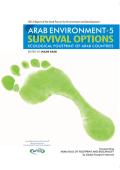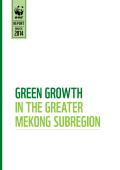This report examines the feasibility of China adopting new global standards for tracking the latest data and trends in its Environmental Goods and Services Sector (EGSS), as a means to inform its green development strategy and identify potential new green growth opportunities. This is the first study to explore how EGSS framework could be adopted by a country with an emerging economy.

The concept of the Sustainable Future was generated in global dialogues; more recently, it has started to transfer to policy making. The paper seeks to discuss how foresight is used to understand the implications of global changes, focusing on the role of green economy strategies in fostering societal, economic progress and environmental conservation. In particular, the use of green economy indicators is reviewed, focusing on the measuring frameworks proposed by different organizations. Finally, an integrated approach is proposed to carry out a systemic and cross-sectoral assessment of key policy instruments aimed at facilitating the transition to a more sustainable future.
This report was launched during China’s Twelfth Five-year Period (2011-2015). After revising the measurement system of the Green Development Index 2011, the report measures the green development level of 30 provinces, municipalities and autonomous regions as well as 38 large and medium-sized cities in China. A Public Satisfaction Survey of the Urban Residents is first introduced into the report. Both the province and the city Green Development Index systems consist of three parts, the green degree of economic growth, the carrying potential of natural resources and environment, and the support degree of government policies. The three parts reflect the production and resource usage efficiency, the situation of environment and resources protection and pollutants emission, and government’s related investment and management respectively. The China Green Development Index Report 2012 has the comprehensive evaluation of the green economy development in China and its importance to China’s rational development and switch in economic development model.

Mekong countries remain relatively well-endowed in natural capital, but signs of pressure and stress on the region’s natural capital are becoming more apparent alongside rapid rates of growth and market development. Escalating land, resource and infrastructure demands arising from urbanization and industrialization combined with a rapidly growing human population means that biodiversity and ecosystem services in the Mekong countries currently face unprecedented threats. At the same time, climate change is affecting ecological productivity and economic vulnerabilities in ways that may encourage even greater pressures on the natural system and cause progressively greater stresses to human and economic systems.
